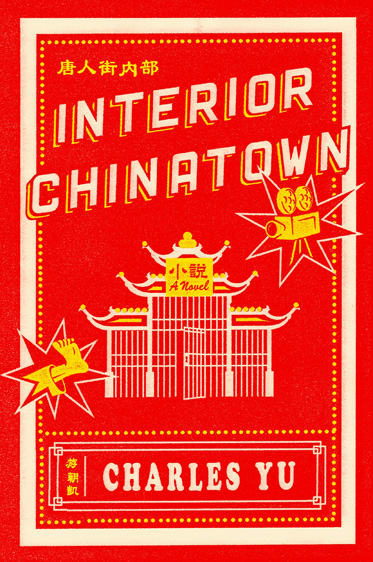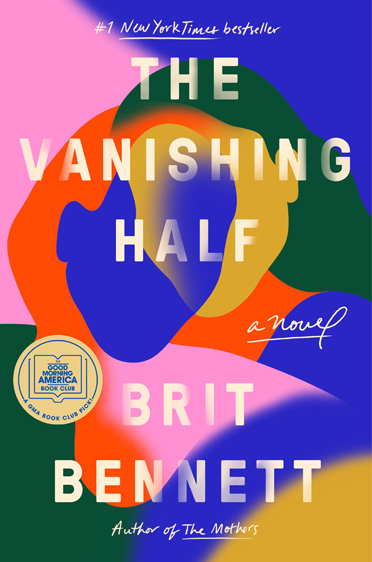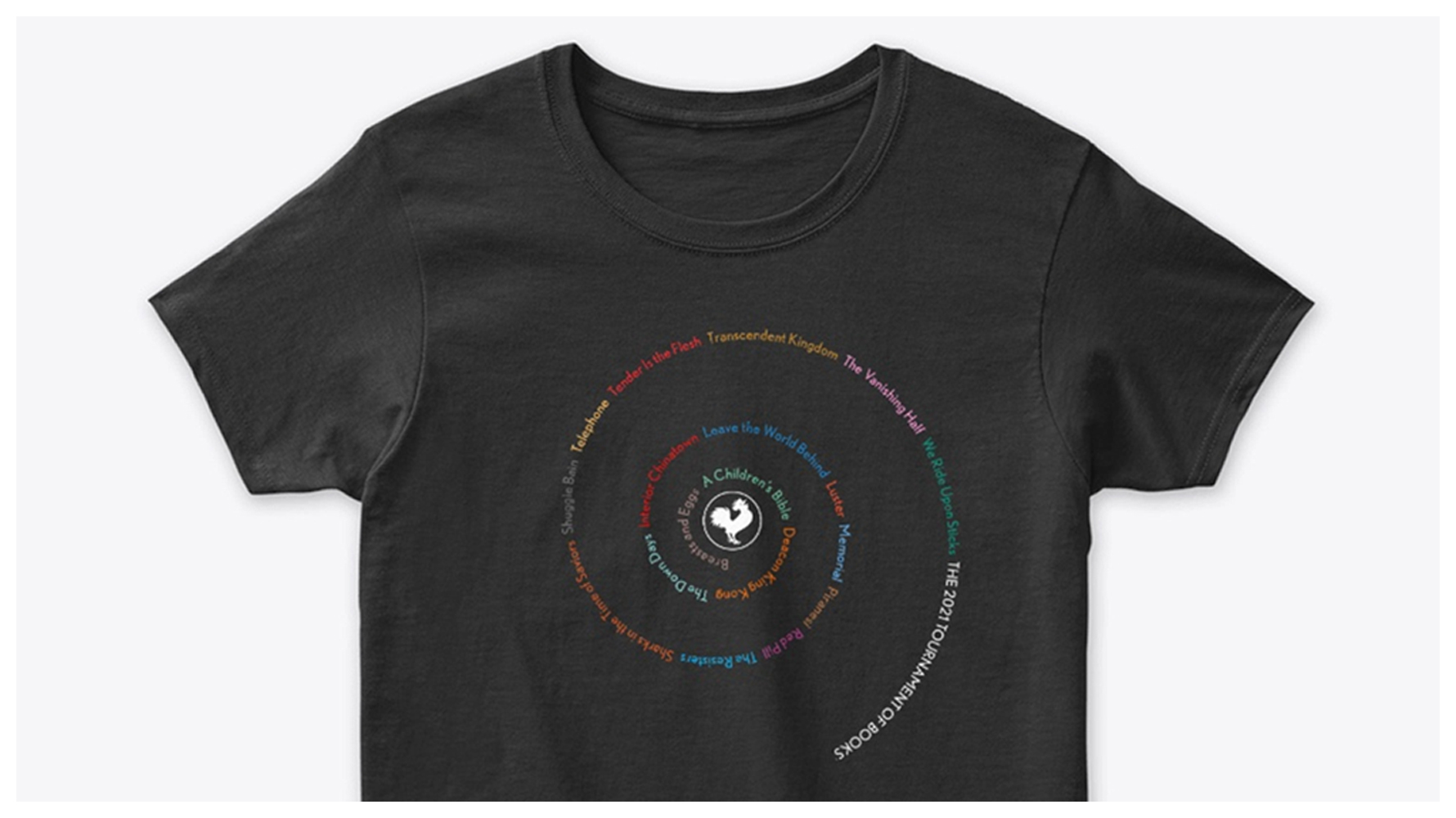-
March 31, 2021
Championship
-
Charles Yu
2Interior Chinatown
v.
Z2The Vanishing HalfBrit Bennett
-
Judged by
All Judges
Sonya Chung: I found Charles Interior Chinatown clever, funny, and cathartic. The characters, by design, stood in for Asian Americans of multiple generations who’ve experienced racist stereotyping and diminished opportunities, diminished human experience. I experienced The Vanishing Half, on the other hand, as less of an “issue” novel (although of course it is too a novel about cycles of racial injustice): The questions and emotions it evokes about generational iterations of racism, and different modes of courage in the face of these, moved me, via dimensional characters, both mind and heart.
| Interior Chinatown | The Vanishing Half |
|---|---|
| 0 | 1 |
Sean Hooks: Interior Chinatown incited laughter three times by page 10. Got to page 39 before it did anything preachy/didactic. Structurally inventive, entertaining, not pabulum, but more clever than good. Diminishing returns. Has a “point,” and it’s sentimental (both are, y’know, bad for literature/art). Easy to read/recommend, but doesn’t inspire rereading. The Vanishing Half excels at character development and has moments of affective, even striking, imagery, but it’s an otherwise unremarkable mainstream bestseller/boxchecker, grandiose but rather predictable. The Vanishing Half is a fulsome novel, however, whereas Interior Chinatown is under 40,000 words. Hard to judge these two narratives. Give me the yuks, I suppose.
| Interior Chinatown | The Vanishing Half |
|---|---|
| 1 | 1 |
Britta Lundin: I shot through Interior Chinatown first and figured, well, there’s no way that can be topped. Inventive, incisive, it deserves a trophy for PHOEBE LAND alone. As a screenwriter myself, I both laughed and winced in recognition. Then I fell into The Vanishing Half and still haven’t climbed out of the emotional well. That meaty, slow-burn, mutual pining second act love story? I feast! It’s the one for me by a nose.
| Interior Chinatown | The Vanishing Half |
|---|---|
| 1 | 2 |
Gabino Iglesias: The Vanishing Half is a brilliant book about identity, race, and otherness that digs deep into familial ties and drama with a slice of everyday life. It’s also a haunting, smart chronicle of the interstitial space between Black and white. Interior Chinatown perfectly matches The Vanishing Half in terms of discussing identity, race, and otherness…and then it adds a little sendup of Hollywood while simultaneously addressing racism head on and forcing readers to rethink the possibilities of the novel format. The Vanishing Half is awesome, but Interior Chinatown is an “awesomeness montage.”
| Interior Chinatown | The Vanishing Half |
|---|---|
| 2 | 2 |
Felicia Davin: What a pairing. Interior Chinatown and The Vanishing Half both examine race, identity, Americanness, the self. Both novels focus on exteriors (bodies, faces, skin, but also, in the Hollywood language of Interior Chinatown, outsides, places, geographies) and their relationship to interiors (homes, feelings, beliefs, desires). Acting crops up in both. Can we only play the roles that are assigned to us—Black, white, Asian? What happens when we reject those roles? I enjoyed Interior Chinatown, but I sank deep into The Vanishing Half and have been thinking about it nonstop since finishing it. Sorrowful and joyful and compelling with a richly drawn cast of characters, The Vanishing Half is the winner for me.
| Interior Chinatown | The Vanishing Half |
|---|---|
| 2 | 3 |
Tobias Carroll: The Vanishing Half and Interior Chinatown are powerhouse novels, wrestling with themes of race, family, and identity. In 2016, I interviewed Esmé Weijun Wang, who pointed out that the generational family saga has historically been a very white subgenre; each of these novels represents a step toward making that space more diverse. In the end, the tiebreaker ends up being a formal one—I’m in awe of the risks taken in telling Interior Chinatown, and I’m equally impressed by the way those risks ultimately help advance the novel’s larger themes.
| Interior Chinatown | The Vanishing Half |
|---|---|
| 3 | 3 |
Nishant Batsha: In my previous decision, I mentioned how I’m drawn to novels that take me back to my desk and help me push my writing forward. Interior Chinatown and The Vanishing Half are a reminder: I have so much to learn. While I still love Interior Chinatown, The Vanishing Half spoke to another part of my writing journey. I came to fiction after training as an academic historian. I love fiction that takes on the challenge of the immense world-building involved in setting a book away from the knowable present—without being weighed down. The Vanishing Half is many things: the passing novel made anew, a story of long-lost twins, an American story, but it’s also one that writes itself into the past with measured breaths of ease. It was a pleasure to read.
| Interior Chinatown | The Vanishing Half |
|---|---|
| 3 | 4 |
Sufiya Abdur-Rahman: I’d read the title The Vanishing Half at or near the top of the Washington Post’s bestsellers list for months by the time the book arrived at my home. I’d wanted to know what all the hoopla was about, what so many people could identify with in a novel about twin sisters so fair that one could pass for white even though both their parents were Black. I hoped it was about more than skin tone and identity, and, oh, it is. The novel is sprawling, spanning decades, coasts, races, genders, sexualities, and classes. It’s hard not to get wrapped up in the saga through the intricate arcs the novel weaves for its characters. At the same time, it’s easy to come away from a story in which people keep parts of themselves hidden, and others never fully know themselves, unable to completely connect. I didn’t have this problem with Interior Chinatown, which delivers an intimacy that’s dramatic, humorous, relevant, and relatable. I’ve spotted Interior Chinatown on the bestsellers list only a few times, but I’m expecting more.
| Interior Chinatown | The Vanishing Half |
|---|---|
| 4 | 4 |
BW Kipnis: The final book for me is one that better activates issues enabling people from full participation within the democracy holding together these United States. This book gives full voice by way of dramatic representation, historic exhibits, and a playful, fluid narrative structure blurring binaries like fact and fiction, Black and white, revealing who is left out, how and why. This book demonstrates the confounding effect that happens when gatekeeping governs the American narrative and individuals disappear into vague archetypes as they immigrate, acculturate, assimilate, only to find themselves invisible to their home present and past offering no exit and quiet decline.
| Interior Chinatown | The Vanishing Half |
|---|---|
| 5 | 4 |
Grace Perry: It’s like these books began with the same writing prompt—describe what it’s like to live in-between whiteness and Blackness—and went in two wildly different, brilliant directions. But where Vanishing Half felt like a kind of novel I’d read before, everything about Interior Chinatown thrilled me. It’s almost dizzyingly sharp. I’d recommend it to anyone.
| Interior Chinatown | The Vanishing Half |
|---|---|
| 6 | 4 |
Rachelle Hampton: I read The Vanishing Half after Interior Chinatown because, to be quite frank, I expected to like it more. I didn’t want to cloud my reading of the latter with my bias toward the former. It’s the same sort of tactic I went with in my first judgment and, in a strange sort of symmetry, the inverse proved true both then and now. The Vanishing Half is beautiful and brutal and gripping, the characters so richly drawn that by the end I felt not just like I knew them but that I had always known them. But before I even finished Interior Chinatown, I knew it’d become one of my favorite books. It’s bold and moving and so damn funny. I haven’t stopped thinking about it since I read it.
| Interior Chinatown | The Vanishing Half |
|---|---|
| 7 | 4 |
Catherine Chung: After saying in my last judgment that Interior Chinatown is a book “I’ve been waiting my whole life to read”, I opened up The Vanishing Half and realized (with some panic), just a page or so in, that I was in trouble. It is just so good. You could not have pried it from my hands while I was reading. It shimmers at the sentence level, the emotional level, the story level—every level, basically, I’m saying. And as a novel it is deeply satisfying—a great story beautifully told, so interesting and urgent and relevant. And still, I’m going to go with Interior Chinatown, though the reason why is partly also what makes its pleasures and satisfactions harder to describe or explain in that it feels like a different beast than what I usually mean when I use the word “novel.” It feels almost like an extended joke that manages to fold the universe into itself, exploding my idea of what a joke or a novel can be or do while simultaneously presenting a whole new way to look at the world and how things work (including stories themselves). For me, Interior Chinatown is that rarest of things—the answer that obliterates the question—and that’s why I’m choosing it again.
| Interior Chinatown | The Vanishing Half |
|---|---|
| 8 | 4 |
M.C. Mah: An extended riff on the uncanny Maya Erskine’s chances of getting the lead in a multiverse spinoff Captain Marvel Disney+ series, Interior Chinatown missed me by a mile. (My thoughts on The Vanishing Half are entered in the record; I stand gently corrected.) This is not to say that underrepresentation isn’t important. If we are to believe that there is no limit to the extent that we imagine ourselves into being—and I do—we must reckon with a culture that’s saddled us with such a thing as racial camera-readiness. But a fixation on stereotype steers us into a lie. We should not be lobbying media companies to take responsibility for representing people of color; we should be letting people of color make irresponsible art.
| Interior Chinatown | The Vanishing Half |
|---|---|
| 8 | 5 |
Alexandra Schwartz: For me, the call between these two popular and lauded novels isn’t close. One, while widely praised as stylistically inventive, felt as rote and canned as the network television shows that it parodies. It fought cliché with cliché, and its laugh-track humor didn’t make me much inclined to laugh. The novel’s message was worthy, but messages are not the point of fiction; they are generally anathema to it. The other novel could not be more formally traditional, and its patient, beautifully managed storytelling engrossed me. Do I wish that the language and character exploration of The Vanishing Half better reflected the knotted nuance of the book’s subject matter? I do. I sometimes felt that the novelist was so intent on keeping the many moving pieces of her story in place that breadth took priority over depth. That said, The Vanishing Half has ambition, intelligence, range, and heart, and it is this reader’s clear winner.
| Interior Chinatown | The Vanishing Half |
|---|---|
| 8 | 6 |
Ingrid Rojas Contreras: Look. I will be forever impressed by what The Vanishing Half does with plotting and time. That it carries stories through past and present timelines and conjoins them at the end, in a climax of secrets past and present revealed, is astounding. The language, the scene-making, and the world-building are masterful. I am going to remain Team Interior Chinatown. It’s been some time now since I’ve finished and I still can’t get over the feeling reading that book gave me—beyond the uncanny cleverness of the book, I am still reeling from the sense of having been privy to the infiltration of an enemy site and the victorious theft of all its spoils.
| Interior Chinatown | The Vanishing Half |
|---|---|
| 9 | 6 |
Kamil Ahsan: When forced to make choices between wildly different but wonderful things, I tend to resort to bizarre analogies. The Vanishing Half hit me like a steam engine. Robust, propulsive, a vehicle associated with devastating damage but whose mechanism is known to me. Interior Chinatown, on the other hand, hit me like a school bus. Heterogeneously peopled, unpredictable, a necessary public service, but how on earth do you drive this thing? Ultimately I’m more intrigued by the bold puzzle box that is Interior Chinatown. I can’t explain why, precisely. It would be like explaining how I’d like to die.
| Interior Chinatown | The Vanishing Half |
|---|---|
| 10 | 6 |
Beatrice Kilat: One of the greatest things that can happen to you is having a sister. Or a brother. Or a cousin, a mother, a friend, a lover, a place or story to return to or leave. The Vanishing Half is cinematic, gripping, contained storytelling. It’s excellent. Interior Chinatown is cinematic, too, playing out in CinemaScope: exciting and fresh, harsh and bright, real and free flowing. It oozes off the page; it’s everything. More than enough.
Drip drip.
| Interior Chinatown | The Vanishing Half |
|---|---|
| 11 | 6 |
Match Commentary
By Kevin Guilfoile & John Warner
Rosecrans Baldwin: Our many congratulations to Charles Yu and his amazing novel Interior Chinatown. We reached out to Mr. Yu over email and he had this to say:
This is so cool. I’ve long been a fan of the Tournament of Books (I even served as a judge once). With previous books I’d thought about how exciting it would be just to get shortlisted—so this is bonkers. I am grateful to the ToB organizers for creating and continuing a unique event that gets people discussing books with intelligence and passion, to the judges and guests and Commentariat for supplying that intelligence and passion, and to all the authors for writing the great books they wrote. I always learn a lot from the judgments and the comments, and this year was no exception. Thank you again—it’s an honor to have been part of a ToB.
We offered Mr. Yu a live rooster and he declined its receipt, so the ToB will make a charitable donation to 826 National in Interior Chinatown’s honor.
There’s a full range of Note Books and related stationery products at fieldnotesbrand.com. Field Notes is proud to once again be a sponsor of the Tournament of Books.
Andrew Womack: Congratulations also to Brit Bennett and the stunning The Vanishing Half! Also many thanks to our judges for all of their efforts this month, and all of the independent booksellers who joined me and Rosecrans in the commentary booth. John and Kevin, what did you think?
John Warner: A reasonably tight, but ultimately comfortable victory for Interior Chinatown, but somewhat less comfortable when you read the judgments and see that there were lots of close decisions along the way.
Kevin Guilfoile: As is often the case with the Rooster championship, John, the most interesting stuff for me can be found in the dissents.
“Messages are not the point of fiction… The Vanishing Half has ambition, intelligence, range, and heart.”
“Interior Chinatown missed me by a mile.”
“The Vanishing Half spoke to another part of my writing journey.”
“I sank deep into The Vanishing Half and have been thinking about it nonstop since finishing it.”
“I fell into The Vanishing Half and still haven’t climbed out of the emotional well.”
“(T)he questions and emotions [The Vanishing Half] evokes about generational iterations of racism, and different modes of courage in the face of these, moved me.”
Obviously, when you experiment with a form as iconic as THE NOVEL, you sometimes end up with something that only superficially resembles one. Understandably, for people (like you and me) who love the novel, have elevated the novel, were expecting “a novel,” it might be uncomfortable to evaluate Interior Chinatown’s novelness. If you show Chitty Chitty Bang Bang to NASCAR driver Kyle Larson, and ask him “what do you think of this car?” he’s going to roll his eyes and shake his head, then vault feet-first through the window of his Camaro and peel out in a cloud of dust and exhaust. Show Chitty Chitty Bang Bang to the next person, and they might say, “Holy shit, this motherfucker can fly? Sweet! Load it up with all that fudge!”
Interior Chinatown kind of skips a lot of the things we celebrate the novel for. It’s not a masterpiece of plot and character. You won’t necessarily scribble sentences from it in your diary because of the delicious way the words combine and settle in your ear. It transports you, certainly, but to a place that cannot exist. On the other hand it accomplishes the thing we hope all novels do. It provides us with that gut punch. The aha moment. The epiphany. It might not be a car as we know it, but it gets you there.
And lordy was it timely. Tragically so.
John: For me, the conceit of Interior Chinatown may give it a kind of higher ceiling in terms of appreciation, provided that the reader leaves the experience satisfied. At first I was like, what is this doing? After a while, there’s a pleasure when you figure it out, ahh…I get it? After that, though, to succeed, the book has to take you somewhere beyond that recognition of the conceit. It has to make something fresh out of that conceit. With a notable exception or two (Judge Schwartz), most of the judges seemed to feel the book managed to both create and then transcend its own conceit.
Kevin: I’ll admit that I am ambivalent about this one. I think Bennett did a more masterful job using the tools of the novelist. Yu created something new and brilliant using tools no one had thought to use before in this context. And I loved both of these books. Is the question, “Which of these is the more successful novel?” or is it “Which of these novels is more successful?” I might have different answers to those questions.
John: I wouldn’t have blinked if the result were reversed. Another one in the books, Kevin. A joy to be able to play our small role, as always. Thanks to Andrew, Rosecrans, all sponsors and supporters, and of course our Commentariat. If you’re looking for another place to keep talking books, come find me all year at The Biblioracle Recommends.
Kevin: Let’s finish up the housekeeping. The winners of this year’s Commentariat pool, selected by random drawing, are Alejandro Castro and itsonlyzach. Congratulations! Send your contact info to talk@themorningnews.org and you can look forward to some gorgeous 2021 ToB merch, plus a one-year subscription from Field Notes to their Quarterly Limited Editions. Being that this week is the start of baseball season, I will throw in a signed copy of my memoir, A Drive Into the Gap, conveniently published by Field Notes.
And in addition to your thoughts on this final, please let us know in the comments which novels you are most looking forward to in 2021 (or, even better, the novels you’ve loved so far). John, what does the Biblioracle have on his list?
John: I’m going to put in a good word for No One Is Talking About This by Patricia Lockwood, Infinite Country by Patricia Engel, and heck, why not, A Bright Ray of Darkness, by Ethan Hawke?
Kevin: Thanks, everybody, for making this event something that is a lot of work for a number of people—not so much for you and me, John—and yet also a thing we all look forward to every year. As always, a total pleasure from the day we started reading to the moment I stop typing this sentence.
Rosecrans: Our big thanks to John and Kevin for yet another year of great commentary. Our massive appreciation again goes out to Field Notes, our presenting sponsor, and a big shout-out to Bookshop, our book sponsor, for their support. We also want to send some very loving thanks to TMN’s one and only Meave Gallagher, our community manager and commenter/reader extraordinaire. Meave, how was this year’s Tournament for you?
Meave Gallagher: I guess I’m going to be sincere, so please excuse the sentimentality. The longer I “manage” the community, the more invested I feel in everyone’s experience of the Tournament, and this year being, well, this year, seeing the Commentariat have such a good time together (match results notwithstanding) has given me a lot of joy during an especially difficult time. So, thanks for commenting, everyone; already looking forward to 2022. (After some naps, I need many naps.)
Andrew: Thank you, Meave, and let me just take one moment to thank all of you, our readers, for following the 2021 Tournament of Books all month long. We love doing this event every year, and we hope you’ve enjoyed reading along with us yet again. And we hope to see you back this summer for another edition of Camp ToB—so make sure you’re signed up for the Rooster newsletter to stay up to date on that.
Four years ago, we didn’t know whether we’d be here now, celebrating the culmination of the 17th edition of the Tournament of Books, but our Sustaining Members made it happen. Internet advertising was going belly-up at the time, and we weren’t sure if we could continue doing this, much less making it bigger and more interesting for our readers. So we decided to ask for your help, and thanks to your ongoing support we’re still here—and have even been able to add Camp ToB and last year’s Super Rooster into the mix. With even more additions, we hope, to come in the near future.
So if you love watching or participating in the Tournament of Books as much as we love making it, please take a few minutes to find out why we ask for your support, and consider becoming a Sustaining Member.
Thanks, everyone, and we’ll see you soon!
New 2021 Tournament of Books merch is now available at the TMN Store. As a reminder, Sustaining Members receive 50 percent off everything in our store. To find out why we’re asking for your support and how you can become a Sustaining Member, please visit our Membership page. Thank you.
Welcome to the Commentariat
Population: You
To keep our comments section as inclusive as possible for the book-loving public, please follow the guidelines below. We reserve the right to delete inappropriate or abusive comments, such as ad hominem attacks. We ban users who repeatedly post inappropriate comments.
- Criticize ideas, not people. Divisiveness can be a result of debates over things we truly care about; err on the side of being generous. Let’s talk and debate and gnash our book-chewing teeth with love and respect for the Rooster community, judges, authors, commentators, and commenters alike.
- If you’re uninterested in a line of discussion from an individual user, you can privately block them within Disqus to hide their comments (though they’ll still see your posts).
- While it’s not required, you can use the Disqus <spoiler> tag to hide book details that may spoil the reading experience for others, e.g., “<spoiler>Dumbledore dies.<spoiler>”
- We all feel passionately about fiction, but “you’re an idiot if you loved/hated this book that I hated/loved” isn't an argument—it’s just rude. Take a breath.




